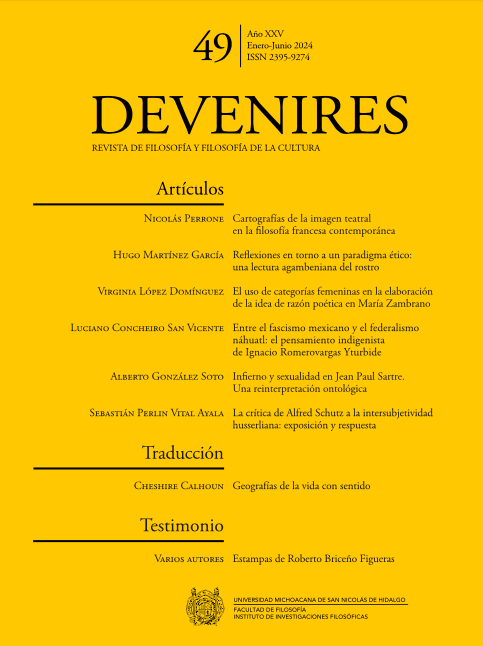Geographies of Meaningful Living
Cheshire Calhoun
DOI:
https://doi.org/10.35830/devenires.v25i49.913Keywords:
the meaning of life, agent-independent evaluative standards, agent-dependent evaluative standards, normative outlookAbstract
Because it is significantly unclear what ‘meaningful’ does or should pick out when applied to a life, any account of meaningful living will be constructive and not merely clarificatory. Where in our conceptual geography is ‘meaningful’ best located? What conceptual work do we want the concept to do? What I call agent-independent and agent-independent-plus conceptions of meaningfulness locate ‘meaningful’ within the conceptual geography of agent-independent evaluative standards and assign ‘meaningful’ the work of commending lives. I argue that the not wholly welcome implications of these more dominant approaches to meaningfulness make it plausible to locate ‘meaningful’ on an alternative conceptual geography —that of agents as end-setters and of agent-dependent value assessments— and to assign it the work of picking out lives whose time-expenditures are intelligible to the agent. I respond to the challenge confronting any subjectivist conception of meaningfulness that it is overly permissive.
References
Robert Audi, “Intrinsic value and meaningful life”, Philosophical Papers 34 (2005): 331-355.
Tal Brewer, “Savoring time: Desire, pleasure, and wholehearted activity”, Ethical Theory and Moral Practice 6 (2003): 143-160.
Cheshire Calhoun, “Standing for something”, Journal of Philosophy 92 (1995): 235-260.
Steven Darwall, Impartial Reason (Ithaca, NY: Cornell University Press, 1983).
Harry Frankfurt, “On the usefulness of final ends”, Iyyun: The Jerusalem Philosophical Quarterly 41 (1992): 3-19.
Harry Frankfurt, The Reasons of Love (Princeton, N.J.: Princeton University Press, 2004).
Betty Friedan, The Feminine Mystique (Nueva York: Dell, 1964).
Sally Haslanger, “Gender and race: (What) are they? (What) do we want them to be?”, Noûs 34 (2000): 31-55.
Sally Haslanger, “Oppressions: Racial and other”, en Resisting Reality: Social Construction and Social Critique (Nueva York: Oxford University Press, 2012).
Thomas Hurka, “The well-rounded life”, Journal of Philosophy 84 (1987): 727-46.
John Kekes, “The informed will and the meaning of life”, Philosophy and Phenomenological Research 47 (1986): 75-90.
Brian Kolodiejchuk, Mother Teresa, Come Be My Light: The Private Writings of the 'Saint of Calcutta' (Nueva York: Doubleday, 2007).
Alastair MacIntyre, After Virtue: A Study in Moral Theory (Notre Dame, IN: University of Notre Dame Press, 1981).
Thaddeus Metz, “Utilitarianism and the meaning of life", Utilitas 15, 1 (2003): 50-70.
Thaddeus Metz, “The meaningful and the worthwhile: Clarifying the relationships”, Philosophical Forum 43 (2012): 435-448.
Thaddeus Metz, Meaning in Life: An Analytic Study (Nueva York: Oxford University Press, 2013).
David Schmidtz, “The meanings of life”, en Life, Death, and Meaning: Key Philosophical Readings on the Big Questions, ed. por D. Benatar (Lanham, MD: Rowman & Littlefield, 2010).
Valerie Tiberius, "Value commitments and the balanced life", Utilitas 17(1) (2005): 24-45.
Gary Watson, “Free agency”, Journal of Philosophy 72 (1975): 205-20.
Susan Wolf, “Meaning and morality”, Proceedings of the Aristotelian Society, New Series, 97 (1997): 299-315.
Susan Wolf, “Happiness and meaning: Two aspects of the good life”, Social Philosophy and Policy 14 (1997): 207-225.
Susan Wolf, “The true, the good, and the loveable: Frankfurt's avoidance of objectivity”, en Contours of Agency: Essays on Themes from Harry Frankfurt, ed. por Sarah Buss y Lee Overton (Boston, MA: MIT Press, 2002), 227-224.
Susan Wolf, Meaning in Life and Why it Matters (Princeton, N.J.: Princeton University Press, 2010).
Wai-hung Wong, “Meaningfulness and identities”, Ethical Theory and Moral Practice 11 (2008): 123-148.
Downloads
Published
How to Cite
Issue
Section
License
Copyright (c) 2024 UMSNH

This work is licensed under a Creative Commons Attribution-NonCommercial-NoDerivatives 4.0 International License.


 Devenires, Año XXVII, Núm. 53, Enero-Junio 2026 es una publicación semestral editada por la Universidad Michoacana de San Nicolás de Hidalgo (Santiago Tapia 403, Centro Histórico, Morelia, Michoacán, México, C.P. 58000, Tel. (+52) 44-3322-3500), a través de la Facultad de Filosofía y el Instituto de Investigaciones Filosóficas (Ciudad Universitaria, Edificio C-4, Morelia, Michoacán, México, C.P. 58030, Tel (+52) 44-3322-3500 ext. 4148). Editor responsable: Dr. Federico Marulanda Rey (
Devenires, Año XXVII, Núm. 53, Enero-Junio 2026 es una publicación semestral editada por la Universidad Michoacana de San Nicolás de Hidalgo (Santiago Tapia 403, Centro Histórico, Morelia, Michoacán, México, C.P. 58000, Tel. (+52) 44-3322-3500), a través de la Facultad de Filosofía y el Instituto de Investigaciones Filosóficas (Ciudad Universitaria, Edificio C-4, Morelia, Michoacán, México, C.P. 58030, Tel (+52) 44-3322-3500 ext. 4148). Editor responsable: Dr. Federico Marulanda Rey (
